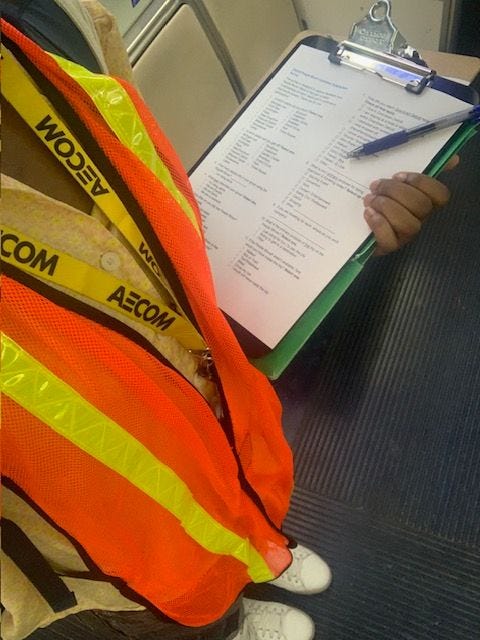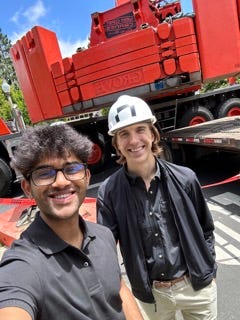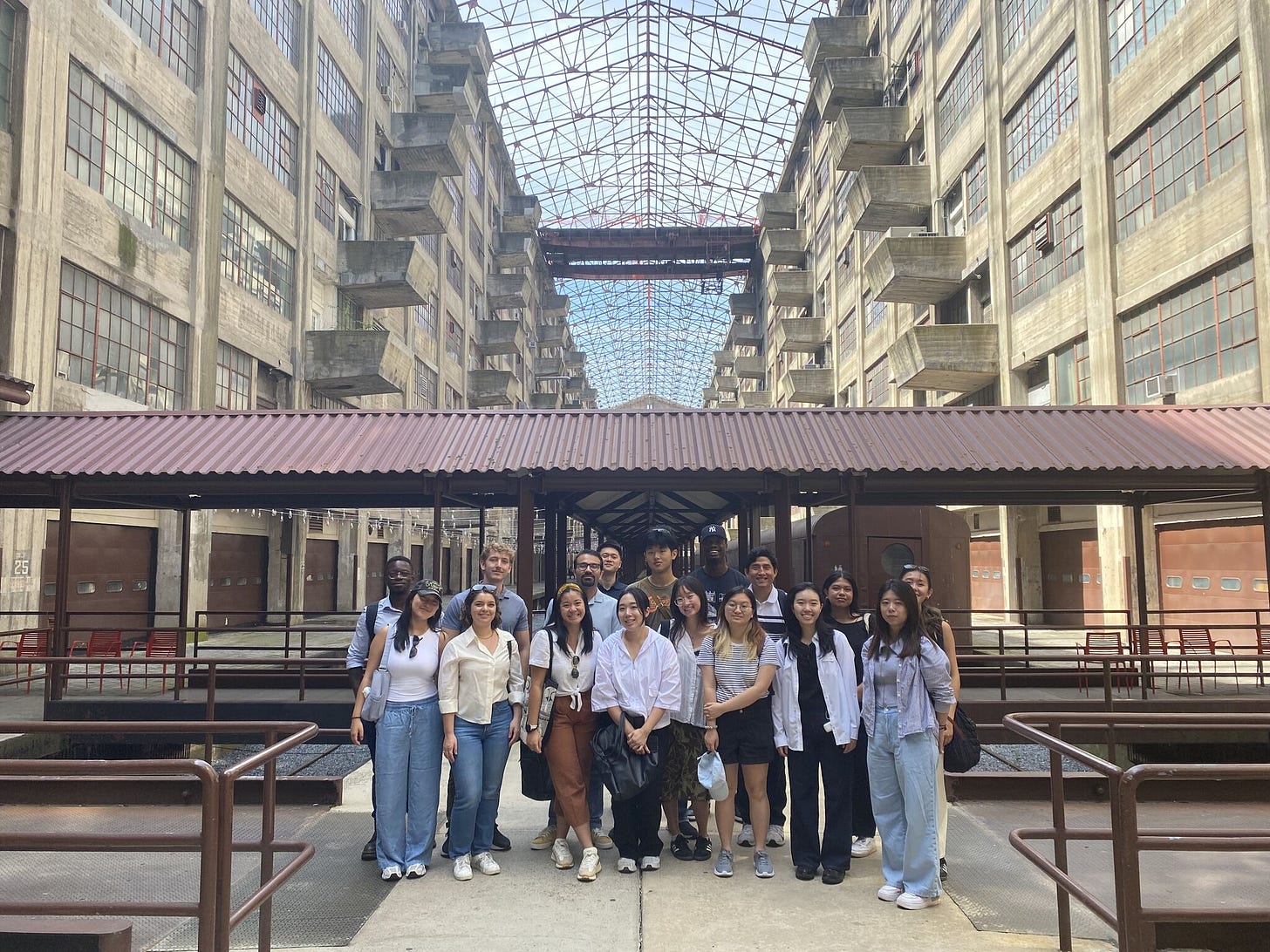Our first-ever cohort of seniors have begun their fourth year and will graduate next year. This academic year is the first time we will have seniors and first-year students at the same time. With everyone back on campus, this fall has provided an opportunity to catch up with members of the degree program and hear about our their adventures and accomplishments over the summer.
I was in their shoes not too long ago—I’m Mariah Evans, the Urban Technology Program Assistant, and a (relatively) recent graduate from U-M myself. 👋 As a lover of the liberal arts, I find the diversity of interests and goals fascinating among our students. After graduation they will take jobs in all types of industries, in all different sectors, and hearing about summer experiences gave me a preview of that. I took a moment this week to catch up with a few of them and learn more about what they did this summer.
💬 Hello! This is the newsletter of the Urban Technology program at University of Michigan, in which we explore the ways that data, connectivity, computation, and automation can be harnessed to nurture and improve urban life. If you’re new here, try this short video of current students describing urban technology in their own words or this 90 second explainer video.
🔭 The Strategists

Devin Vowels, senior: Gensler
Devin: I worked at Gensler, an architecture and design firm, in the San Francisco office, in their strategy studio as a Design, Strategy and Technology Intern. My work was helping them think through projects, doing diagramming work, interviews with people, brainstorming, and building documents.
Mariah: Which Urban Technology classes were most useful in that work?
Devin: Maybe UT 230, since that course helped me learn how to visualize data and communicate it. Also UT 210, with Dr. Chanel Beebe, was helpful with the interview process. They were really shocked that I had experience with interviewing and was able to set that up in a formal way. So with those classes it put me in a position to think through problems graphically and collaboratively, and also interview people and document the insights responsibly.
Mariah: What was your biggest takeaway?
Devin: Being able to switch perspectives on a project. A lot of the work at Gensler was more consulting-type work, where you usually aren’t going to see the project all the way to the end, you’re only involved for a specific moment. It's very easy to start thinking about the end product, but that's not always the project in front of you. So, it’s very important to understand the context of your work and decide whether to focus in or step back and see the bigger picture.
Odiso Obiora, senior: AECOM
Odiso: I worked for AECOM, an infrastructure consulting firm. They have a design-based strategic consulting ‘leg’ of their firm, called Strategy+, which is where I worked. I was able to participate in a range of different projects from program management to app development to community engagement.
Mariah: Most useful UT class for that range of work?
Odiso: I would say UT 330, Matthew Wizinsky’s interaction design studio. It helped me become more comfortable with graphic and visual things, especially the second half where we were planning and approaching a big project. I was able to get really comfortable developing an approach to something complex through that class, which helped with the internship.
Mariah: What was your biggest takeaway from the internship?
Odiso: That a lot of the work they do is very diverse; there’s a wide range of projects. Also, the team had a range of backgrounds, so being comfortable learning the language of a new field or a new space. Also being aware of what you bring to the table, as well as what you don't know and need to learn. This allowed me to develop an individual approach to complex things, knowing what you don't know and knowing what you need to learn was really helpful.
🔗 The Product Manager
Aditya Nimbalkar, junior: Abodu
Aditya: During my internship at Abodu, a Series A startup specializing in prefabricated backyard homes, I served as a Product Manager Intern and worked on two key projects. First, I launched features within the customer-facing app to enhance property data communication between the consumer sales team and customers, improving the overall customer experience. Second, I spearheaded a project utilizing augmented reality to allow customers to visualize potential installations and facilitating smoother decision-making.
Mariah: What part of your Urban Technology education was most useful to you in your internship?
Aditya: As a Product Manager Intern, I applied skills in technology, design, and understanding how cities work, essential due to the company's need to navigate city permitting processes daily. The Urban Tech program provided me with a strong foundation in these areas, and the course "Reading/Writing the World," taught by Violet Whitney, was particularly impactful. It encouraged me to explore technology beyond traditional digital platforms and consider alternative mediums like augmented reality for problem-solving. This approach inspired me to implement creative technological solutions during my internship at Abodu.
Mariah: What was your biggest takeaway?
Aditya: I gained valuable insights into business operations, communicating effectively with key stakeholders to understand their needs, and devising innovative solutions to address urban challenges. I was inspired by working alongside individuals dedicated to tackling California’s housing shortage and formed meaningful relationships with professionals passionate about transforming urban living.
📝 The Planner
Kenyatta Washington, junior: City of Detroit Planning and Development Office
Kenyatta: This summer I interned with the City of Detroit's Planning and Development Office. During my time there, I had the opportunity to work on a variety of projects and initiatives, including the Community Benefits Ordinance (CBO), Community Outreach Ordinances, the Master Plan, the I-375 Redevelopment Project, and attending city council meetings. Some of the key CBO projects I worked on were the Fisher 21 Redevelopment Project, the Henry Ford Expansion Project, and the Hotel Water Square. It was exciting to be involved with these develops that will transform the city.
One of the most relevant courses from my Urban Technology studies that I applied during my internship was UT 201: Change-Making in Cities. In that course, Jermaine Ruffin emphasized how we, as planners, can engage meaningfully with communities and initiate change in urban spaces, which directly connected to the work I did.
Mariah: Which of the projects you worked on was the most eye-opening?
Kenyatta: The I-375 Redevelopment Project. This project, which encompasses critical aspects such as development, land use, acquisitions, community engagement, and even reparations, gave me a broader understanding of the multifaceted nature of planning. It also shifted my perspective, showing me that urban planning is a highly interdisciplinary field that requires passion and adaptability to manage complex tasks.
💵 The Economic Developer
Jenna Li, senior: New York City Economic Development Corporation
Jenna: I worked at NYCEDC as their Initiatives intern. I was under the Creatives Industry Team which included Digital Gaming, Film/TV, and Fashion but was later put on some projects under the Tech team, as well, when the two teams merged towards the end of the internship. I mostly did desk research on different organizations and the programs being offered, as well as workforce development analysis in the digital gaming and fashion industries. I also assisted in hosting roundtables where stakeholders talked about how NYC could market itself to the digital gaming industry and develop a strategic plan to grow that industry. And, I was involved in conversations about how, with the help of EDC funding, different organizations within New York City can partner to grow a digital gaming ecosystem in the city.
Mariah: Is there an Urban Technology class that was relevant for that kind of work?
Jenna: UT 201: Change-Making in Cities was probably the most useful class for my internship. Most of my internship involved understanding partnerships between organizations and how they play a role in growing an industry. I think Change-Making helped me understand a lot more about how different stakeholders make their decisions, whether they are in the private sector, or the public sector, or somewhere in between. Having that prior knowledge helped me to see, during roundtables and in research, how different stakeholders positioned themselves within the industry and how their missions aligned with EDC’s mission.
Mariah: What was your biggest takeaway from your time there?
Jenna: Thinking more about the industry/project landscape and strategies for industry growth. As someone minoring in UX design and computer science, I’ve always paid more attention to smaller details rather than the bigger picture when being part of group projects. This internship made me realize that it’s important to keep the bigger picture in mind even when working on the smaller details, because it’s working on smaller details that helps paint the bigger picture.
🧑🏫 Faculty Hiring - Closing Soon!
With the growth of our degree program we have the privilege of growing our teaching faculty too. We currently have two parallel searches for tenure track and practice track professors of any rank to develop field-defining research and teaching in urban technology and design in our Bachelor of Science in Urban Technology program. We're looking for candidates with expertise in design, technology development, and urban and geospatial analytics. If that sounds like you, let's talk?
These weeks: A book talk by Megan Kimble, a UT faculty meeting, strategizing an employer funnel. Lil’ town hall meeting focused just on curriculum updates. UT 430 site visit to Little Village in Detroit. How is it not October; how is it already October? 🏃






